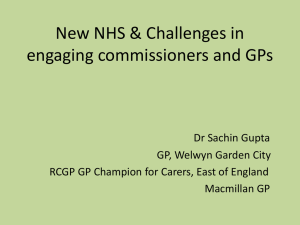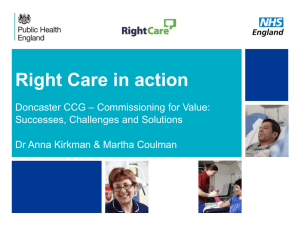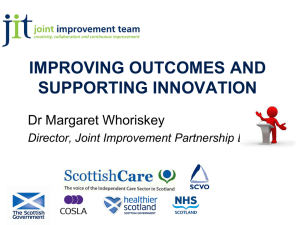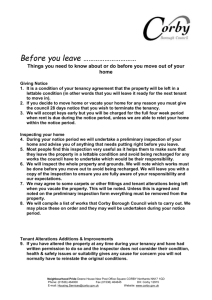here - NHS Corby CCG
advertisement
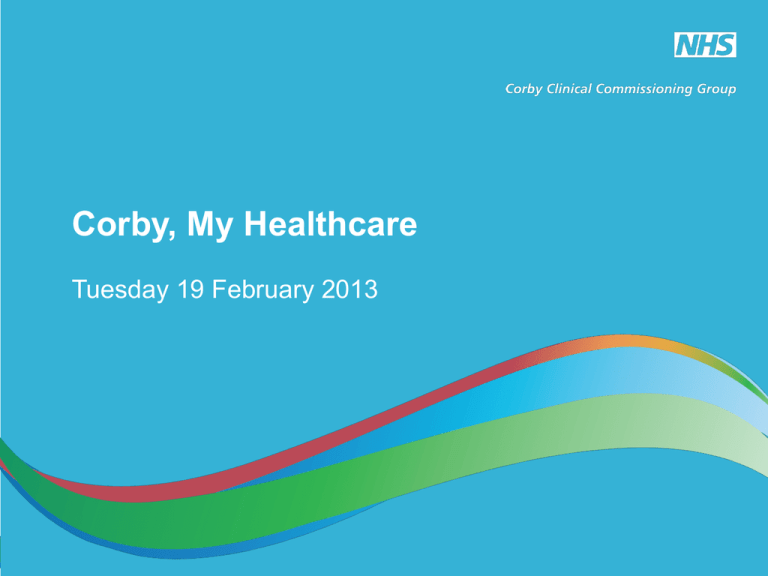
Corby, My Healthcare Tuesday 19 February 2013 Housekeeping • Please turn mobile phones to silent/off • No fire alarm is planned, if you do hear the alarm, make your way to the fire exit Aims of today ■ To keep you up to date with what’s happening in Corby ■ To give you the opportunity to have your say on health services ■ To build the relationship between the CCG and our local population NHS Corby CCG update Dr Peter Wilczynski, Chair Designate Authorisation • Formal process to bring CCGs into being • We had to demonstrate our ability to: – commission safely – manage the funding – improve quality, reduce inequality and deliver improved outcomes for our patients within the available resources • Similar to an Ofsted inspection in schools • Outcome expected to be announced soon Corby Urgent Care Centre • Corby Minor Injuries Unit & x-ray service have moved into the centre (all open 8am-8pm) • Observation bays open • Centre can assess and treat: – Minor Injuries – such as strains, sprains, wounds, minor burns and fractures – Urgent medical conditions that can’t wait to see a GP – children with high temperatures, breathing problems, bladder and other painful infections, abdominal pain, severe headaches, worrying worsening of a long term condition Corby Urgent Care Centre Our local hospitals • We are now responsible for negotiating the county contract for hospital services with Kettering General Hospital • Hospitals are in talks over closer working • Healthier Together Get involved • Patient Participation Groups – contact your local GP surgery • Corby Pulse – become a member • ‘Like’ our Facebook page • Follow us on Twitter @NHSCorby • Come to our meetings • Go to www.corbyccg.nhs.uk Urgent Care Services Dr Miten Ruparelia, Clinical Vice Chair Recent local headlines Issues • Ageing and growing population • KGH have experienced a sustained increase in attendances at Accident and Emergency • Inappropriate attendances at A&E • Discharge of patients into the community • “Walking the Floors” at A&E/KGH Our vision for Urgent Care Self Care Increase in self management plans including personal health budgets Doctor First Appropriate appointments in primary care/ reduced A&E attendances Urgent Care Centre Supported by Integrated Rapid Response Team (Adult and Paediatric) Supported by x-ray and ultrasound services Access to observation bays GP Managed Step Up Beds Thackley Green and Community Hospital Acute Admission System Change Enablers - 111 - Urgent Care Dashboard - Better patient information Achievements in 2012/13 • Urgent Care Centre, with 12 assessment couches, opened • Rapid Response home visiting team established • Two step-up beds commissioned at Corby Community Hospital and four from Thackley Green Specialist Care Centre enabling GPs to admit directly avoiding the need for a hospital admission • Near patient testing for Deep Vein Thrombosis commissioned from General Practice, reducing the need for an urgent hospital assessment • Self care information for under 5s and over 50s published • Development of urgent care pathways to ensure the patient receives the best care at the ‘right place at the right time’ Our plans for 2013/14 • Continued focus on Urgent Care Centre • Expanding the use of the observation couches in the UCC to include the provision of IV antibiotics and IV Iron • Rollout of ‘111’ in April 2013 • Assess the Doctor First pilot and if it is proven to be successful roll out to all practices • Assess the Advanced Nurse Practitioner into care homes pilot and if successful roll out to all care homes in Corby • Commission an enhanced Cardiac Rehabilitation scheme • Frail and Elderly care review Table discussions • Do you think we are doing the right things during 2013/14? • What should the CCG take into account when making difficult decisions? • What other services would you like see in Corby? • What services do you think need improving/changing in Corby? Refreshment break – 15 minutes Mental Health Commissioning for the People of Corby Pat McCarthy Who we are and what we aim to cover • The Joint Commissioning Team commissions mental health services for: – NHS Corby CCG – NHS Nene CCG – Northamptonshire County Council • Our Commissioning strategy - informed by 4 Strategies – Nation Mental Health strategy, No Health without Mental health – Northamptonshire Joint Adult Mental Health Strategy – National Dementia Strategy – CAMHs Strategy • The Financial context • Commissioning Intentions for 2013/14 • Table top discussion to hear your views Why Commissioning of Mental Health Services is Important for CCGs • At any one time 20% of women & 17% of men are affected by depression or anxiety • Mental Illness accounts for £77 billion of lost productivity each year • 20% of total disease burden is attributable to mental illness compared to cardiovascular disease (16.2%) and cancer (15.6%) • Mental Illness begins early – 10% of children have diagnosable MH condition & 50% of lifetime mental illness is present by age of 14 • No other health condition matches mental ill health in the combined extent of prevalence, persistence and breadth of impact • Demographics of people with dementia in the UK : – In 2008 - 700,000 costing £17 billion – In 2038 -1.4 million costing over £50 billion – 1 in 4 people aged 80+ have dementia • People with Serious Mental Illness are high users of general health services: – Lifestyle factors – smoking & obesity – Substance misuse – Medically unexplained symptoms – Psychological elements of long term conditions • Northamptonshire CCG’s spend £128m on Mental Health services – higher than average of similar CCGs “ A sad soul can kill you quicker than a germ” – John Steinbeck Mental Health Strategic Objectives Mental Health • Northants Adult Mental Health Strategy 2009 anticipated many themes of national strategy “No Health Without Mental Health” published in 2011 – Focus on Well-being, resilience building & prevention (at population level) – Holistic approach – integrating physical & mental health care – Strengthening primary care MH services & common MH pathway – Supporting Recovery Living Well with Dementia (National Strategy) – Improve dementia pathway including care in primary care – Improve diagnosis and early support and intervention – Improve support for carers and carers well being – Improve care in hospitals and care homes – Establish memory assessment services – Reduce use of anti-psychotic medication Our shared principles and values • People are part of families whose members will have their own needs and knowledge to share, the value of friends and being part of a community are essential to mental health • Personalisation • Co-production • Recovery • Prevention • Collaborative care • Partnerships in pathway working • Values-based and evidence-based practice What has been achieved • Talking therapies (IAPT) and well being services in all localities • Early intervention and re-ablement services to support treatment & recovery in community • New local forensic care pathway for mentally disordered offenders • Improved rehabilitation pathway reducing costs of out of area care • Worked with voluntary and independent providers to increase supported living opportunities • Implemented co-commissioning with service users • Developed pathways, services and skills to address physical health reviews for people with severe mental health problems • Successful pilot of use of personal budgets in mental health services What has been achieved continued • Reducing expenditure on mental health services whilst improving quality and care pathways • Established county-wide memory assessment services for dementia • Improving county dementia diagnosis rates from 43%49% • Reduction in use of anti-psychotic medication in people with dementia • Partnership work with Northamptonshire County Council in commissioning of new dementia workforce training Financial context • In 2012/13 Northamptonshire CCGs will spend £128m on mental health services for all care groups • The Mental Health programme spend includes the costs of : – primary care mental health and secondary care mental health services (more than half spent with main NHS mental health provider) – services which are very specialist and which local commissioners do not control – substance misuse services – mental Health prescribing • Northamptonshire CCGs spend approximately £12m more per year than average on mental health services Commissioning Intentions • Shift money and care for people with mild to moderate depression and anxiety to primary care mental health services to enable improved access, best practice and increased capacity in local services • Increase support to people with physical health problems who have emotional needs such as depression and anxiety • Improve waiting times and referral pathway so people access the right services first time • Improve the care and pathway for people in mental health crisis by increasing intensive home treatment to enable them to remain in their homes and continue with their lives Commissioning Intentions • Review services for older people with mental health problems to improve the support and efficiency of the pathway • Increase capacity within the memory assessment service • Increase diagnosis rates & improve training and pathways in primary care for dementia • Continue to personalise services through increase in personal health budgets • Continue to work with services users, carers and other partners to identify what needs to be delivered to meet needs within each MHPbR care pathway Commissioning Intentions • Improve the way we measure the effect of services on improving peoples recovery through a working group to develop ways to measure outcomes and experience reported by service users. • Continue to co-commission with service users and carers through procurement projects • Develop services in primary care that will support people to manage their mental health and recovery without admission to specialist services • Continue to achieve efficiencies in the way we deliver mental health services to bring our mental health spend closer to the average Children and Young people’s Emotional Well Being and Mental Health • Pooled budget between LA and the CCG • Lead commissioner of county wide emotional well being and mental health services is children’s Joint commissioning team within the CCG • Universal, Targeted and Specialist services commissioned jointly • Young Healthy Minds Partnership (formerly CAMHS partnership) – development and implementation of strategy Strategy 2010-2013 • Young people and parent carers engagement • Tackling the stigma of mental health • Promoting emotional well being and early intervention- ie: children’s centres - schools • Giving particular support to vulnerable young people ie: Looked After Children • Proactively supporting vulnerable families • Developing pathways to support jointly with the LA- using the Common Assessment Framework(CAF) • Develop skills, knowledge and competencies of the workforce • Improved communication and information The therapeutic continuum From small ‘t’ to big ‘T’ Small t Making every day things therapeutic, e.g. rooms, space, food, how you communicate Big T Semi –structured activity based interventions, e.g. drama, music, sport, play, art / craft Talking therapies, Individual counselling, Group therapy, family therapy etc Specialist therapies, e.g. CBT Psychoanalysis Whole system Integrated Care Pathway Commissioning intentions 2013-2014 • Consolidate and review progress over the last 3 years • Review of commissioned targeted and specialist emotional well being and mental health services • Recommendations for commissioning beyond 2014 in line with NCC • Re-define relationship with schools as commissionerscontinue to build access to support services • Focus upon the early years and early intervention for vulnerable families • Greater understanding of and responsiveness to locality needs If you would like further information on • Public and service user involvement in commissioning https://www.gpc.eoe.nhs.uk/page.php?page_id=316 • Mental Health Payment by Results http://www.dh.gov.uk/health/2012/12/mental-health-pbr/ • National Mental Health Strategy No Health without Mental Health http://www.dh.gov.uk/en/Publicationsandstatistics/Publications/Publicati onsPolicyAndGuidance/DH_123766 • Dementia Strategy http://www.dh.gov.uk/health/category/policy-areas/socialcare/dementia/ • Children and Young People’s Mental health Services http://www.asknormen.co.uk Table top discussion: With the increasing demands on services what can we all do to manage our mental health needs? In particular: • What helps you to manage your own or your child’s mental health? • What can your community do to help you manage your own or your child’s mental health needs? • How can primary care mental health services (including your GP) help you manage your own or your child’s mental health? • How would you like/do you think the public should be involved in MH commissioning for Corby? Pre-submitted Questions Thank you for attending Please fill in your feedback form


